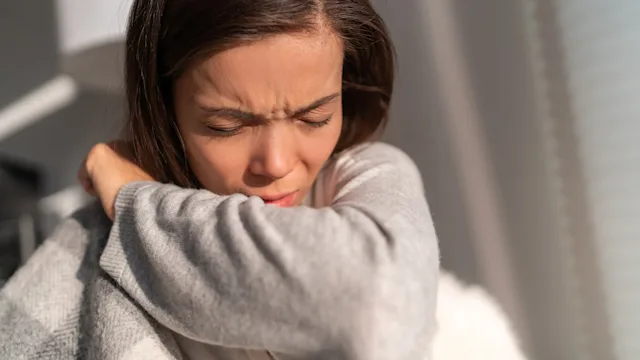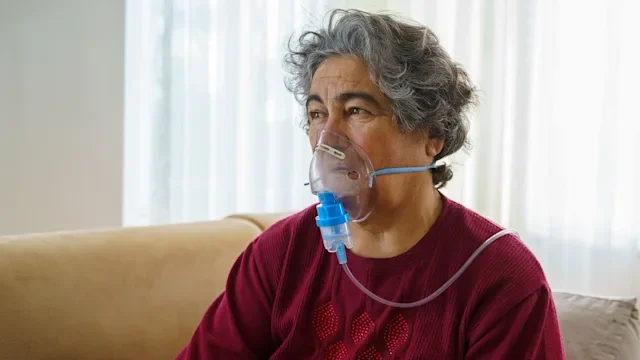Key takeaways:
Respiratory syncytial virus (RSV) causes the common cold and other respiratory tract infections. Adults can get RSV many times throughout their lives.
Common RSV symptoms in adults include cough, congestion, and runny nose.
Adults can develop trouble breathing when they have RSV, especially if they’re older than age 65 or have chronic medical conditions.
Respiratory syncytial virus (RSV) is one of many viruses that cause the common cold during the winter. RSV is best known for causing bronchiolitis in young children. But adults can get RSV too.
Most adults who come down with RSV develop only mild symptoms. But older adults and people with certain medical conditions are at risk of developing more serious RSV symptoms. Every year, tens of thousands of adults are hospitalized with RSV infections. Being able to recognize the symptoms of adult RSV can keep you and your loved ones safe this season.
Let’s take a look at the most common RSV symptoms in adults, as well as when to get medical attention.
Search and compare options
What are the most common RSV symptoms in adults?
Symptoms of adult RSV usually feel like the common cold. Most adults who get RSV develop an upper respiratory tract infection, which means the virus invades the nose, throat, or sinuses.
Common symptoms of RSV in adults are:
Runny nose
Congestion
Sneezing
Decreased appetite
Sore throat
Low energy
Mild cough

Some people develop only a few symptoms, while others develop all of them. It’s also possible to have RSV and not feel sick at all. But you’re less likely to have no symptoms with RSV illness as you age, especially once you’re older than age 65.
Can RSV symptoms in adults become more severe?
Yes. Sometimes, the RSV virus can move from your upper respiratory tract to your lower respiratory tract. This means RSV infects your airways and lungs and causes more severe symptoms.
More intense coughing is a sign that the virus has moved into the lower airways and lungs, and it’s among the most common symptoms of RSV illness. The cough may be wet and occur during the day and night.
Respiratory syncytial virus (RSV) treatments for adults: How you treat RSV depends on how severe your illness is. For some, home remedies are enough to manage symptoms. Learn more about your options.
Can RSV turn into pneumonia? RSV can also lead to more serious illnesses, like pneumonia. Here’s how to recognize the symptoms and prevent RSV complications.
RSV vaccination for adults: Learn all about RSV vaccines, including who’s eligible and how long protection lasts.
Other more severe symptoms of RSV in adults include:
Having trouble breathing
Wheezing
Tiring easily with activity
Having a fever
People with medical conditions like COPD (chronic obstructive pulmonary disease), asthma, or congestive heart failure may also feel like their usual symptoms are getting worse.
When RSV moves into the airways and lungs, people can also develop pneumonia and bronchitis.
Who is most at risk for getting seriously sick with RSV in adults?
Some adults are at higher risk for developing serious RSV illness. You’re at risk if you’re older than age 65 or if you have a history of:
Asthma
COPD
Stem cell transplant
Heart disease (especially congestive heart failure)
Solid organ transplant
Diabetes
Knowing whether you’re at risk for serious RSV is the first step in taking action to keep yourself (or your loved ones) safe from RSV illness.
When should you get medical care for RSV in adults?
If you’re at risk for serious RSV and you develop any RSV symptoms — even mild ones — you should see a healthcare professional. They can test you for RSV and other viruses that cause similar symptoms, like COVID-19 and the flu.
A healthcare professional will also monitor your illness to make sure you aren’t developing a lower respiratory tract infection. If you have another medical condition, a healthcare professional may also prescribe higher doses of your usual medications or additional medications to help you fight off the virus.
You should also get immediate medical care if:
You develop a fever
You have trouble breathing
Your medication doesn’t seem to be working
How do you treat RSV symptoms in adults?
There’s no specific treatment for RSV. Most treatment focuses on relieving symptoms while your immune system fights off the virus. Most people can manage their symptoms at home using treatments that also help relieve the common cold.
Home remedies and non-prescription over-the-counter (OTC) treatments include:
OTC cold medications to relieve cough and congestion
Acetaminophen (Tylenol) or ibuprofen (Motrin) to relieve fever and muscle ache
Cold or warm beverages and lozenges to relieve sore throat
Nasal saline sprays to clear out mucus and congestion
If you have asthma or COPD, you may need additional treatments like steroids. You may also need to adjust your inhaler doses while you’re sick. People with weakened immune systems or who’ve had stem cell or solid organ transplants may need additional treatment for RSV illness.
Preventing RSV symptoms in adults
There are steps you can take to prevent adult RSV. Here’s how to keep yourself and your loved ones healthy during RSV season:
Get vaccinated. Arexvy, Abrysvo, and mRESVIA are RSV vaccines approved for adults ages 60 and older. Abrysvo is also approved for certain pregnant women. Studies show that people who get the vaccine are much less likely to develop more serious respiratory tract symptoms from RSV.
Avoid contact with people who have RSV or cold symptoms. People who are sick with RSV are contagious for 3 to 8 days. If a friend or household member has RSV symptoms, try to keep your distance for at least 8 days.
Keep your distance from babies and children with RSV. RSV spreads rapidly among babies and young children because they’ve never been exposed to the virus before. Often, children bring RSV into a home and spread it to other family members. Consider separating vulnerable adults from young children as much as possible during peak RSV season.
Wear a mask. Wearing a mask can help keep you from getting RSV, whether you’re in public or at home. It isn’t always possible to avoid contact with loved ones who are sick. Your household members should wear a mask if they aren’t feeling well to lower the risk of spreading the virus.
Wash your hands often. Handwashing keeps you from passing the virus if you're sick or picking up the virus when you’re not sick. Wash with soap and water for at least 20 seconds, or use an alcohol-based hand sanitizer.
Disinfect surfaces. Unlike some viruses, RSV can survive on hard surfaces for several hours. That means you can get sick with RSV if you touch a surface that has the virus on it. You should disinfect frequently touched surfaces in high-traffic rooms like kitchens and bathrooms.
Stay up-to-date with other vaccines. People who get sick with RSV and another virus, like the flu, at the same time are more likely to need care in a hospital. If you live with an adult who’s at high risk for serious RSV illness, make sure everyone in your home is up-to-date with their vaccines.
These steps may seem simple, but they’re lifesaving — especially for adults who live in long-term care facilities where RSV can spread quickly.
Frequently asked questions
Adults with RSV often experience symptoms within 4 to 6 days of coming into contact with the virus. RSV symptoms tend to follow the general stages of the common cold. Often, symptoms are at their worst 4 to 6 days after they start. They should fade away within 1 to 2 weeks.
Cough is a very common symptom of RSV, and it can make you feel pretty miserable. You may notice a mild cough at the start of your illness. But this cough can worsen and stick around for 10 days or more. People who are at risk for more severe illness, such as older adults and people with lung disease, should contact a healthcare professional to help closely monitor symptoms.
RSV can cause different types of cough. An RSV cough can be wet or dry. A dry cough results from an irritated airway and can sound hacky. With a wet cough, you’ll be able to hear fluid rattling around in your airways. A wet cough can point to an infection in the lower airways, such as pneumonia. Be sure to get medical attention if you feel short of breath or have trouble breathing.
Adults with RSV often experience symptoms within 4 to 6 days of coming into contact with the virus. RSV symptoms tend to follow the general stages of the common cold. Often, symptoms are at their worst 4 to 6 days after they start. They should fade away within 1 to 2 weeks.
Cough is a very common symptom of RSV, and it can make you feel pretty miserable. You may notice a mild cough at the start of your illness. But this cough can worsen and stick around for 10 days or more. People who are at risk for more severe illness, such as older adults and people with lung disease, should contact a healthcare professional to help closely monitor symptoms.
RSV can cause different types of cough. An RSV cough can be wet or dry. A dry cough results from an irritated airway and can sound hacky. With a wet cough, you’ll be able to hear fluid rattling around in your airways. A wet cough can point to an infection in the lower airways, such as pneumonia. Be sure to get medical attention if you feel short of breath or have trouble breathing.
The bottom line
RSV infection can happen at any age. Most adults will experience mild RSV symptoms like congestion and runny nose. But adults older than age 65 and those with certain medical conditions have a greater risk of developing severe illness. Many people with serious RSV illness need care in a hospital.
If you’re older than age 65 or have chronic medical conditions and you come down with cold symptoms, see a healthcare professional. And, if you have trouble breathing or fever, get care right away.

Why trust our experts?



References
Centers for Disease Control and Prevention. (2025). Clinical overview of RSV.
Centers for Disease Control and Prevention. (2025). How RSV spreads.
Centers for Disease Control and Prevention. (2025). RSV in adults.
Centers for Disease Control and Prevention. (2025). RSV vaccine guidance for adults.
Colosia, A., et al. (2023). Systematic literature review of the signs and symptoms of respiratory syncytial virus. Influenza and Other Respiratory Viruses.
Curran, D., et al. (2022). Impact of respiratory syncytial virus disease on quality of life in adults aged ≥50 years: A qualitative patient experience cross‐sectional study. Influenza and Other Respiratory Viruses.
U.S. Food and Drug Administration. (2023). FDA approves first vaccine for pregnant individuals to prevent RSV in infants.












